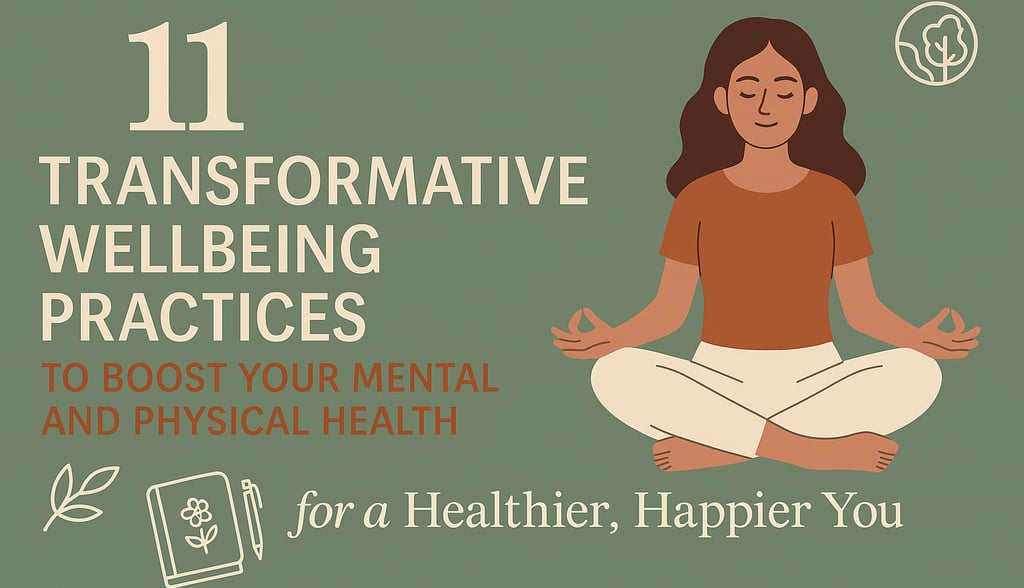11 Transformative Wellbeing Practices to Boost Your Mental and Physical Health
In today’s fast-moving world, finding balance between your mental and physical health can feel like a challenge. But even small, intentional changes can lead to powerful results. This guide brings you 11 simple yet transformative wellbeing practices that can help you live a healthier, more fulfilling life — starting today.
6/4/20252 min read


In today’s fast-moving world, finding balance between your mental and physical health can feel like a challenge. But even small, intentional changes can lead to powerful results. This guide brings you 11 simple yet transformative wellbeing practices that can help you live a healthier, more fulfilling life — starting today.
1. Strengthen Your Physical Health
Physical health is the cornerstone of overall wellbeing. Nourish your body with whole foods, stay hydrated, move daily, and schedule regular check-ups. When your body is functioning well, your energy and mood naturally improve
2. Move Your Body, Boost Your Mood
Exercise isn’t just for fitness—it’s therapy. Activities like walking, yoga, dancing, or cycling release endorphins, reduce anxiety, and improve sleep. You don’t need a gym membership—just 30 minutes of movement a day can do wonders.
3. Mindfulness and Meditation
Practicing mindfulness helps you tune into the present moment, reduce stress, and manage emotions. A few minutes of mindful breathing or guided meditation can improve focus and emotional resilience.
4. Eat with Awareness
Your brain and body both thrive on a well-balanced diet. Prioritise colourful fruits and vegetables, whole grains, lean proteins, and healthy fats. Mindful eating—chewing slowly, listening to hunger cues—can also improve digestion and satisfaction.
5. Prioritise Restorative Sleep
Sleep is your body’s reset button. Aim for 7–8 hours per night, and create a soothing bedtime routine—dim lights, unplug from screens, and wind down with a book or deep breathing. Sleep restores your energy, mood, and memory.
6. Connect with Others
We are wired for connection. Healthy relationships lower stress, improve longevity, and offer emotional support. Stay in touch with loved ones, make time for deep conversations, and seek out community spaces where you feel valued.
7. Journal for Clarity and Growth
Journaling is a powerful tool for self-reflection. Writing down your thoughts and emotions helps you process experiences, reduce mental clutter, and build self-awareness. Try gratitude journaling or daily reflections to shift your mindset.
8. Adopt a Holistic Mindset
Wellbeing isn’t just about eating well or working out—it’s about how you think, rest, relate, and reflect. A holistic approach means caring for your mind, body, and spirit. Balance is key: no one area should be neglected.
9. Take a Digital Detox
Too much screen time can drain your focus and mood. Set tech boundaries—like phone-free mornings or device-free meals. Use apps consciously, and make space for real-life connection and quiet time.
10. Embrace Nature Therapy
Spending time in nature—even just 20 minutes a day—can lower cortisol, ease anxiety, and enhance creativity. Walk in the park, sit under a tree, garden, or simply watch the clouds. Nature heals in subtle, profound ways.
11. Make Time for Creativity and Play
Play isn’t just for kids—adults need it too. Painting, music, dance, crafts, or playful activities unlock joy and reduce tension. Creativity fuels curiosity, strengthens emotional health, and brings more lightness into your day.
✨ Final Thoughts
Wellbeing doesn’t require a major life overhaul. It’s built through small, consistent habits that support your body and mind. Start with one or two of these practices and build from there. Remember—your health is in your hands, and you deserve to feel well, balanced, and empowered.
Contact us:
